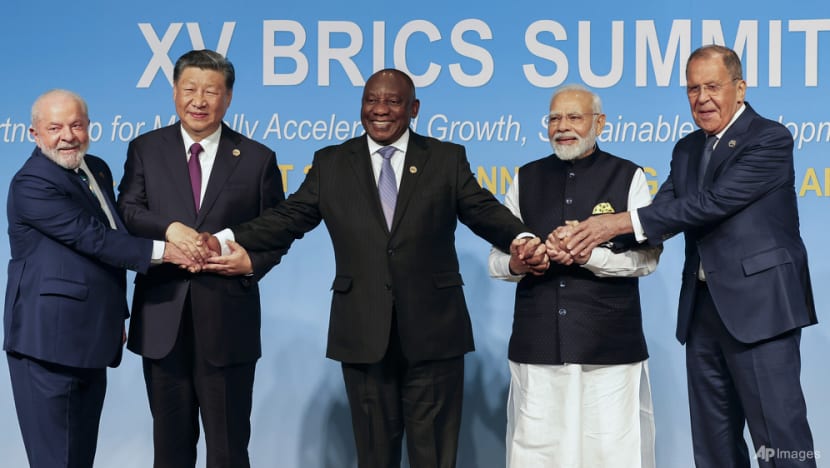Iran, Saudi Arabia and Egypt among 6 nations set to join BRICS economic bloc

Brazil's President Luiz Inacio Lula da Silva, China's President Xi Jinping, South Africa's President Cyril Ramaphosa, India's Prime Minister Narendra Modi and Russia's Foreign Minister Sergei Lavrov pose for a BRICS group photo during the 2023 BRICS Summit at the Sandton Convention Centre in Johannesburg on Aug 23, 2023. (File photo: AP/Gianluigi Guercia)
JOHANNESBURG: BRICS leaders announced on Thursday (Aug 24) the admission of six new countries from next year as the club of large and populous emerging economies seeks to reshape the global order.
The BRICS countries - Brazil, Russia, India, China and South Africa - agreed at their annual summit to make Argentina, Ethiopia, Iran, Saudi Arabia, Egypt and the United Arab Emirates full members from Jan 1 next year.
The announcement was made at the BRICS summit in Johannesburg by South African President Cyril Ramaphosa, whose country is the current BRICS chair.
"This membership expansion is historic," said Chinese President Xi Jinping, whose nation is the most powerful in the group of non-Western states that represents a quarter of the world's economy and 40 per cent of its population.
"The expansion is also a new starting point for BRICS cooperation. It will bring new vigour to the BRICS cooperation mechanism and further strengthen the force for world peace and development."
This is the second time that BRICS has decided to expand. The bloc was formed in 2009 by Brazil, Russia, India and China. South Africa was added in 2010.
Ethiopian Prime Minister Abiy Ahmed hailed what he called "a great moment" for his country.
"Ethiopia stands ready to cooperate with all for an inclusive and prosperous global order," he said on X, formerly known as Twitter.
In Iran, senior presidential adviser Mohammad Jamshidi described the move as a "historic development and a strategic success" for Tehran's foreign policy.
Calls to enlarge BRICS had dominated the agenda at the three-day summit and exposed divisions among the bloc over the pace and criteria for admitting new members.
But the group, which makes decisions by consensus, had agreed on "the guiding principles, standards, criteria and procedures of the BRICS expansion process", said Ramaphosa.
Two of the group's other leaders are attending the summit: Brazilian President Luiz Inacio Lula da Silva and Indian Prime Minister Narendra Modi.
Russian President Vladimir Putin did not travel to the summit after the International Criminal Court issued an arrest warrant for him in March for the abduction of children from Ukraine.
He has participated in the summit virtually, while Russia was represented at the announcement in Johannesburg by Foreign Minister Sergey Lavrov.
Nearly two dozen countries had formally applied to join the club from across the "Global South", a broad term referring to non-Western nations.
About 50 other heads of state and government attended the summit, underscoring what BRICS leaders say is the attractiveness of its message.
RISING CLOUT
United States officials have played down the likelihood of BRICS emerging as a geopolitical rival, describing the bloc as a highly diverse collection of countries containing both friends and rivals.
The BRICS countries are a disparate mix of big and small economies, and democratic and authoritarian states, and the candidates seeking membership and those admitted to the club also reflect this variety.
But despite differences, BRICS leaders expressed a common belief that the international system was dominated by Western states and institutions and was not serving the interests of developing nations.
Lula said that with the admission of six new members, the bloc now represented 46 per cent of the world's population and an even greater share of its economic output.
The summit underlined divisions with the West over the war in Ukraine, and the support Russia enjoys from its BRICS partners at a time of global isolation.
South Africa, China and India have not condemned Russia's invasion while Brazil has refused to join Western nations in sending arms to Ukraine or imposing sanctions on Moscow.














